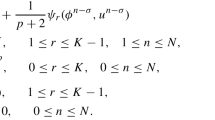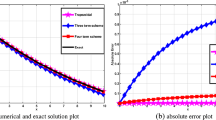Abstract
Space discretization of some time dependent partial differential equations give rise to ordinary differential equations containing additive terms with different stiffness properties. In these situations, additive Runge-Kutta (additive RK) methods are used.
For additive RK methods the curve of absolute monotonicity gives stepsize restrictions for monotonicity. Necessary conditions for nontrivial curves of absolute monotonicity are the nonnegativity of the additive RK coefficients and some inequalities on some incidence matrices. In this paper we characterize strong stability preserving additive Runge-Kutta methods giving some order barriers and structural properties.
Similar content being viewed by others
References
Ascher, U.M., Ruuth, S.J., Spiteri, R.: Implicit-explicit Runge-Kutta methods for time-dependent partial differential equations. Appl. Numer. Math. 25, 151–167 (1997)
Constantinescu, E.M., Sandu, A.: Multirate timestepping methods for hyperbolic conservation laws. J. Sci. Comput. 33, 239–278 (2007)
Dekker, K., Verwer, J.G.: Stability of Runge-Kutta methods for stiff nonlinear differential equations. CWI Monographs 2. Amsterdam (1984)
Ferracina, L., Spijker, M.N.: Stepsize restrictions for the total-variation-diminishing property in general Runge-Kutta methods. SIAM J. Numer. Anal. 42, 1073–1093 (2004)
Ferracina, L., Spijker, M.N.: Strong stability of singly-diagonally-implicit Runge-Kutta methods. Appl. Numer. Math. 58, 1675–1686 (2008).
Gerisch, A., Griffiths, D.F., Weiner, R., Chaplain, M.A.J.: A positive splitting method for mixed hyperbolic-parabolic systems. Numer. Methods Partial Diff. Equ. 17, 152–168 (2001)
Gottlieb, S.: On high order strong stability-preserving Runge-Kutta and multi step time discretizations. J. Sci. Comput. 25, 105–128 (2005)
Gottlieb, S., Shu, C.W.: Total variation diminishing Runge-Kutta schemes. Math. Comput. 67, 73–85 (1998)
Gottlieb, S., Shu, C.W., Tadmor, E.: Strong stability-preserving high order time discretization methods. SIAM Rev. 43, 89–112 (2001)
Higueras, I.: On strong stability preserving time discretization methods. J. Sci. Comput. 21, 193–223 (2004)
Higueras, I.: Representations of Runge-Kutta methods and strong stability preserving methods. SIAM J. Numer. Anal. 43, 924–948 (2005)
Higueras, I.: Strong stability for additive Runge-Kutta methods. SIAM J. Numer. Anal. 44, 1735–1758 (2006)
Kennedy, C.A., Carpenter, M.H.: Additive Runge-Kutta schemes for convection-diffusion-reaction equations. NASA Technical Memorandum NASA/TM-2001-211038. Langley Research Center, Hampton, VA, 2001 (2003)
Kennedy, C.A., Carpenter, M.H.: Additive Runge-Kutta schemes for convection-diffusion-reaction equations. Appl. Numer. Math. 44, 139–181 (2003)
Ketcheson, D.: Highly efficient strong stability-preserving Runge–Kutta methods with low-storage implementations. SIAM J. Sci. Comput. 30, 2113–2136 (2008)
Ketcheson, D., MacDonald, C.B., Gottlieb, S.: Optimal implict strong stability preserving Runge–Kutta methods. Appl. Numer. Math. (2008). doi:10.1016/j.apnum.2008.03.034
Kraaijevanger, J.F.B.M.: Contractivity of Runge-Kutta methods. BIT 31, 482–528 (1991)
Martin, R.H.: Nonlinear Operators and Differential Equations in Banach Spaces. Wiley, New York (1976)
Pareschi, L., Russo, G.: Implicit-explicit Runge-Kutta schemes for stiff systems of differential equations. In: Brugnano, L., Trigiante, D. (eds.) Recent Trends in Numerical Analysis, vol. 3, pp. 269–289 (2000)
Pareschi, L., Russo, G.: Implicit-explicit Runge-Kutta schemes and applications to hyperbolic systems with relaxation. J. Sci. Comput. 25, 129–155 (2005)
Ruuth, S.J.: Global optimization of explicit strong-stability-preserving Runge-Kutta methods. Math. Comput. 75, 183–207 (2006)
Ruuth, S.J., Spiteri, R.J.: Two barriers on strong stability preserving time discretization methods. J. Sci. Comput. 17, 211–220 (2002)
Ruuth, S.J., Spiteri, R.J.: High-order strong-stability-preserving Runge-Kutta methods with downwind-biased spatial discretizations. SIAM J. Numer. Anal. 42, 974–996 (2004)
Shu, C.W.: Total variation diminishing time discretizations. SIAM J. Sci. Comput. 9, 1073–1084 (1988)
Shu, C.W., Osher, S.: Efficient implementation of essentially non-oscillatory shock-capturing schemes. J. Comput. Phys. 77, 439–471 (1988)
Spijker, M.N.: Stepsize conditions for general monotonicity in numerical initial value problems. SIAM J. Numer. Anal. 45, 1226–1245 (2007)
Spiteri, R.J., Ruuth, S.J.: A new class of optimal high order strong stability preserving time discretization methods. SIAM J. Numer. Anal. 40, 469–491 (2002)
Zhong, X.: Additive semi-implicit Runge-Kutta methods for computing high speed nonequilibrium reactive flows J. Comput. Phys. 128, 19–31 (1996)
Author information
Authors and Affiliations
Corresponding author
Additional information
Research supported by the Ministerio de Educación y Ciencia, Project MTM2005-03894.
Rights and permissions
About this article
Cite this article
Higueras, I. Characterizing Strong Stability Preserving Additive Runge-Kutta Methods. J Sci Comput 39, 115–128 (2009). https://doi.org/10.1007/s10915-008-9252-2
Received:
Revised:
Accepted:
Published:
Issue Date:
DOI: https://doi.org/10.1007/s10915-008-9252-2




